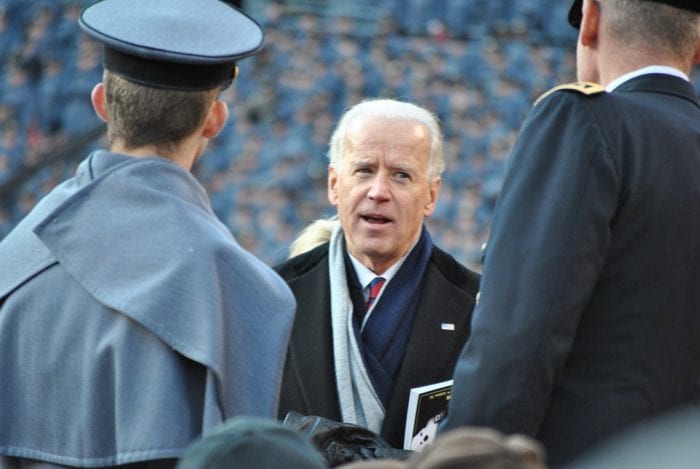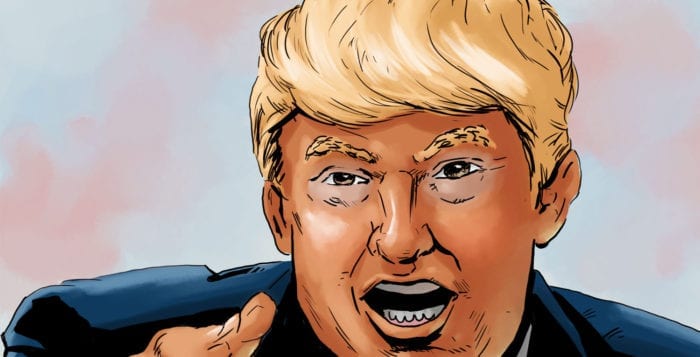By Rich Acritelli
President Joe Biden (D), Jan. 20: “This is America’s day. This is democracy’s day. A day of history and hope. Of renewal and resolve. Through a crucible for the ages America has been tested anew and America has risen to the challenge. Today, we celebrate the triumph not of a candidate, but of a cause, the cause of democracy. The will of the people has been heard and the will of the people has been heeded.”
These were the words of the newly inaugurated 46th president of the United States that addressed citizens on his first day as the leader of this nation. Unlike previous years, the historic landscape of Washington, D.C., did not have the large crowds to pay tribute to the incoming and outgoing presidents due to the COVID-19 pandemic. This was a different ceremony in every imaginable way, that saw Biden surrounded by former presidents Barak Obama (D), George W. Bush (R) and Bill Clinton (D), along with military, government and Supreme Court figures.
For the first time since 1869 when Andrew Johnson (National Union) refused to be present for the transfer of power to Ulysses S. Grant (R), there was no presence of the immediate past president, Donald Trump (R), who was on his way home to Florida.
Biden mostly spoke to the people across America that saw him on the television, the Internet and on the radio. By looking at the numerous problems of this nation, the new president has continually stated that he expects to work across party lines to better unify our people. Although he has an enormous task in front of him, this is not an unusual situation, as other previous presidents dealt with similar situations during their terms.
John Adams and Thomas Jefferson
In 1801, Thomas Jefferson (D-R) was inaugurated after one of the most controversial elections in our history. Through the support of Alexander Hamilton, who pushed Congress to accept Jefferson over Aaron Burr, outgoing President John Adams (Federalist) was forced out of office. Even as Jefferson was the president and Burr the vice president, Adams refused to stay for the inauguration, and he went home to Massachusetts.
Jefferson spoke about the divisions in the country and claimed that we were “all Democratic-Republicans and all Federalists,” within the United States. This Founding Father entered the White House without a glaring endorsement from the voters and he presented the willingness to become a consensus builder amongst the different political parties. Jefferson expressed his concerns that our government had grown too strong under President George Washington (no affiliated party) and Adams, at the expense of the people. He wanted limitations on the size of the government and believed that the people should hold more power.
James Madison and James Monroe
Directly after the War of 1812, and the term of President James Madison (D-R), the last of the Virginia dynasty to run the United States was James Monroe (D-R). This figure who was later known for an “era of good feelings,” spoke of the necessity of admitting new states to the union, the need to have a “wise partition of power” between the states and federal government and regulation of trade with foreign countries. Monroe was at the helm of leadership at a vastly different point that saw our people at a crossroads.
He was the last resemblance of the Revolutionary War generation of leadership that pushed Monroe to balance the direction of his government through old and new ideas. While Monroe was a popular figure, he had to handle the negative tensions that were felt by the northern and southern states over the War of 1812.
During this conflict, politicians from New England openly spoke out against the support of sending their soldiers to aid the southern and western states that were fighting the British. There was also talk by politicians from this region that if the government continued this war that secession was a possibility. Monroe also had to contend with the growth of slavery within the new states and territories, and the tensions that expansion created for this government.
James Buchanan and Abraham Lincoln
In 1857, James Buchanan (D) ascended to the presidency as an experienced leader who served in the Pennsylvania State Assembly, in Congress, as a secretary of state and a minister to Russia. On paper, it looked as if Buchanan had enough credentials to steer the United States through the treacherous waters of the late 1850s. A strong politician before he entered the White House, Buchanan nevertheless is considered one of the worst presidents in American history.
When he replaced the outgoing Franklin Pierce (D), Buchanan complained that the nation was consumed through constant debates over the slavery issue. This pro-states-rights president accepted the merits of the Kansas-Nebraska Act that promoted the use of popular sovereignty to decide the fate of slavery in the Upper Midwest. Buchanan’s timid demur did not quell the violence between pro-slavery and abolitionist forces which threatened the peace and stability of the union.
Buchanan believed that the judicial branch was responsible in determining the future of slavery in America. He did not want to utilize authority of the executive branch to rule on this explosive problem. The Dred Scott case played into the central ideas of Buchanan that the government was bound to follow the Supreme Court’s decisions. He supported the ruling against Scott that promoted the notion that a slave had no rights, was property and could be moved north of the Missouri Compromise without being set free.
Abraham Lincoln (R) closely monitored the lack of actions by Buchanan and he publicly spoke out against the political use of compromises. When he debated Stephen Douglas for the Illinois Congressional Senate seat, he was recognized on the national level over his refusal to endorse the expansion of slavery, while the South saw him as a direct threat toward the future of slavery and would never accept his future rule.
During the transitional period when Buchanan met with Lincoln, he expressed to the new leader, “If you are as happy to become president of the United States as I am to stop being president and go home, you are very happy.” With Buchanan in attendance, Lincoln recognized the start of secession and he told the South that he would not end slavery. Although Lincoln spoke out against the prospects of war, he stated that he would protect the citizens, their property and the laws of this nation. The inauguration of 1861 marked conflicting viewpoints of strength within the presidency. In one sense there was the weakest figure ever to lead in Buchanan, while his predecessor Lincoln, next to Washington, was one of the strongest presidents to ever guide the United States — especially through the horrors of the Civil War.
Dwight D. Eisenhower and John F. Kennedy
Nearly 100 years after Lincoln took his oath of office, the United States watched as a new generation of citizens became the leaders of this nation. President Dwight D. Eisenhower (R) was an incredibly trusted general during World War II and through his two presidential terms from 1952-1960. When our people looked at Eisenhower, they observed a grandfatherly figure. On the other hand, our citizens saw the popular John F. Kennedy (D) as a fellow war veteran who was still young, and had a family which resided in the White House.
While this was not a negative period, Kennedy marked a far different approach toward the goals of this country. With the Cold War expanding in Cuba and Vietnam, Kennedy expressed the strength of the United States to continually “pay any price” and to “oppose any foe.” He was also in the middle of the civil rights movement that had leaders like Martin Luther King Jr. who demanded the government creates the same freedoms for all American people. King expected Kennedy to finally establish an America that was prepared to fully end the terrible strains of segregation in the early 1960s.
Jimmy Carter and Ronald Reagan
When Ronald Reagan (R) defeated Jimmy Carter (D) in November of 1980, this country was in an apparent downward spiral. This was the third and final chance that Reagan had to win the presidency, and up until the victory of Biden, Reagan was the oldest leader in our history. Americans had a “question of confidence” over the Vietnam War, the resignation of Richard M. Nixon (R), the frustrations of the oil crisis and our citizens watched in disbelief as radical Iranian students overran our embassy in Tehran and held Americans for 444 days. Reagan spoke about the necessity of whipping inflation and getting more people back to work to compete with the economic powers of Germany and Japan.
The former California governor addressed the untrue notion that there were no more “heroes” left in the United States. He reassured this country that our “heroes” worked in the factories, farms and were the entrepreneurs that sought new opportunities and wealth.
As Carter listened, Reagan said the growth of the government and its immense spending and debt was a problem for our people. Both older and younger Americans responded to the words of this immensely popular politician who was known as the Great Communicator.
While the Carter administration should have earned additional credit over the release of the hostages, the moment that Reagan was sworn in, our detained people were immediately freed and placed on a plane that flew to West Germany. Right away, Reagan made it known that America would not tolerate widespread disrespect toward our interests and people. The emergence of Reagan presented the willingness of our citizens to regain the same prosperity and respect that had transformed the United States into a superpower.
It is not difficult to understand that Biden, as he enters the Oval Office, has a challenging presidency ahead of him. Since the start of our republic, our presidents have had to deal with major problems that have tested the will and resolve of this proud nation.
Rocky Point students Chloe Fish, Sean Hamilton, Carolyn Settepani and Madelyn Zarzycki contributed to this article.






